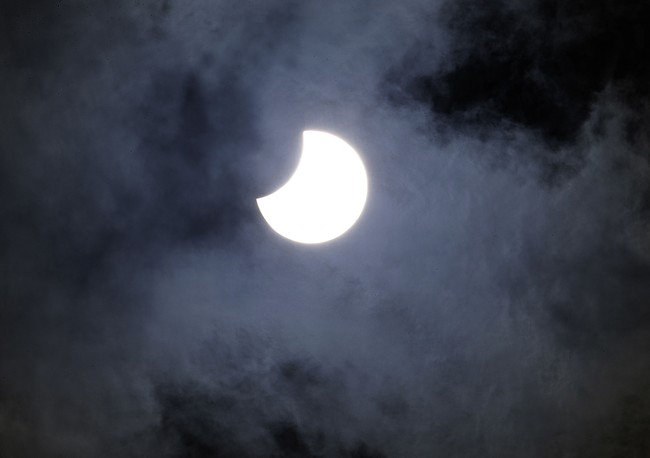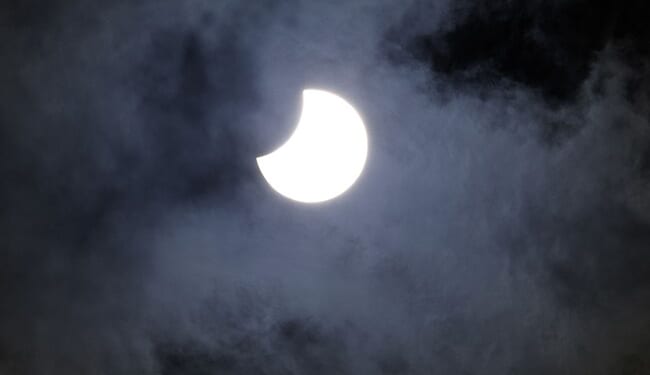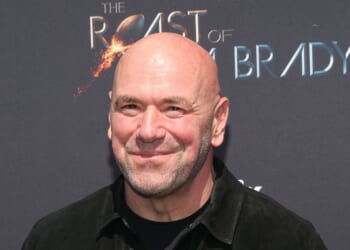
Tomorrow at around 2:00 PM Central Time, the moon will slip across the disk of the sun, blocking its light for a narrow strip of land from Mexico to Maine.
The eclipse of the sun is not a “rare” event. An eclipse happens every eighteen months or so somewhere on Earth, usually over the ocean. The big difference on Monday is that it will happen in North America, and the media has created hysteria surrounding it.
“Is this a disturbance in the heavens or a pure product of a grotesque news cycle where everything has to be a topic of ‘the national conversation’?” asked a New Yorker.
It’s a fair question. But I think this would be a BFD (to quote Joe Biden) with or without the news media.
In ancient times, people saw eclipses and other unusual natural occurrences as signs from god(s). What am I saying about ancient times?
God is sending America strong signs to tell us to repent.
Earthquakes and eclipses and many more things to come.
I pray that our country listens. 🙏
— Marjorie Taylor Greene 🇺🇸 (@mtgreenee) April 5, 2024
There was mass hysteria then as shamans and holy men prayed for the gods’ mercy and begged them to restore the sun.
More than a million people are going to be on the road, traveling to somewhere they can see the eclipse when it achieves totality. A total of 31.6 million people are living in the path of the eclipse’s totality. It’s extremely rare and special that so many humans will share an experience like this. That alone makes the media overkill worth it.
Who is in the path of the eclipse and are planning of witnessing it? pic.twitter.com/ucEA1QkLez
— Daniel and his Swiftie buddy, Evan (@DanielB69842312) April 7, 2024
Some of those present during the last eclipse in the U.S. in 2017 shared their observations with the New York Times.
They described the hours leading up to the eclipse, when the weather gets colder, when you’re suddenly aware of how much the sun is heating us. In Oregon, the streetlights had come on and the birds went silent at 10 in the morning. Kids got tired and more snugly, bedtime behavior triggered.
“I’m not a spiritual person. I don’t usually think about the bigger picture of what we’re swimming in,” Ali said. “But I felt that at the eclipse. I had a sense that I’m this one person in this huge thing.” That’s the feeling she’s hoping to encounter again. Christa compared the experience to the awe felt by astronauts seeing Earth from space for the first time.
A mass wedding in Arkansas; an “X Marks the Spot” celebration in Paducah, KY, which has the good fortune to have been in the path of the last total solar eclipse in the U.S. in 2017; and an event in Carbondale, IL, at the Southern Illinois football stadium where 50,000 people are expected are just a few of the eclipse-themed activities being held. Hotels across the path of totality have been booked for months as “umbraphiles” (“shadow lovers,” in Latin) follow the path of eclipses across the world.
The economic impact on these small communities will be life-changing for some. Not everyone who bet big on the eclipse will cash in, but many towns like Carbondale are seeing a huge economic boost.
There’s a downside. Hospitals along the path of totality have been dreading the eclipse, according to Axios.
With millions of people flocking to big cities and small towns to witness Monday’s eclipse, hospitals are on high alert for increased traffic accidents, the potential for mass casualty events and, of course, eye damage.
Eclipse fervor will especially strain understaffed health care systems in rural towns that may not have dealt with an event of this scale.
As the eclipse nears, the feeling is “more of apprehension” for hospitals, said Lacey Carter, chief nursing officer at Ozarks Healthcare in West Plains, Missouri.
The big picture: Some hospitals in the path of totality, which stretches from Texas to Maine, told Axios they’ve spent more than a year preparing with emergency drills and regular coordination with local officials.
New York Times writer Melissa Kirsch recalls the description of an eclipse by The Atlantic’s Annie Dillard.
“There was no sound. The eyes dried, the arteries drained, the lungs hushed. There was no world.”
Most of our communal enthusiasms these days are human-made: the Oscars, the Super Bowl, the election, the new Beyoncé album. A total solar eclipse is a product of the natural world. It happens without elaborate stagecraft, without any outlay of capital. For this reason alone, it’s a rare occurrence. And there won’t be another in the United States until 2044.
It’s true: The birds stop singing, insects stop moving and start their sleep cycle, mammals bed down as if it is night, and a general uneasiness settles over the land. But as a physics professor at SIU told NBC, it’s a rare opportunity to connect with the universe.
“I like to tell people that a total solar eclipse is a personal, spiritual experience,” said Corinne Brevik, an assistant professor in the School of Physics and Applied Physics at Southern Illinois University. “It’s one of those events in life that help us connect to the universe we live in.”












